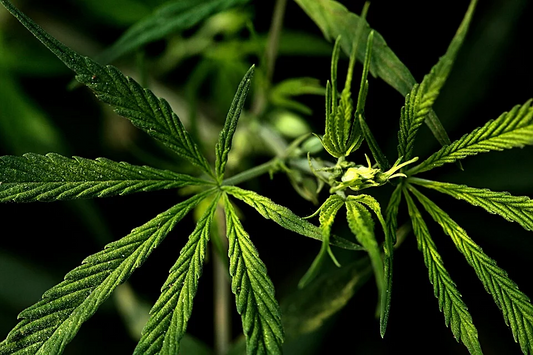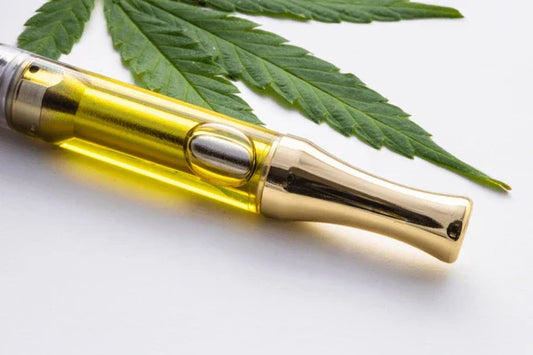-

350mg EvieLab CBD Sublingual Pearl - 70 Pearls
Novel Food application number: RP349 EvieLab CBD Sublingual Pearls are designed to deliver target...350mg EvieLab CBD Sublingual Pearl - 70 Pearls
Novel Food application number: RP349 EvieLab CBD Sublingual Pearls are designed to deliver target...Login to view price -

900mg CBD Calm Cannabreeze Prefilled Pod
Experience deep relaxation and clarity with the 900mg CBD Calm Cannabreeze Prefilled Pod, a premi...900mg CBD Calm Cannabreeze Prefilled Pod
Experience deep relaxation and clarity with the 900mg CBD Calm Cannabreeze Prefilled Pod, a premi...Login to view price -

900mg CBD Calm Cannabreeze Prefilled Pod Vape Kit
The 900mg CBD Calm Cannabreeze Prefilled Vape Kit delivers a smooth, relaxing experience designed...900mg CBD Calm Cannabreeze Prefilled Pod Vape Kit
The 900mg CBD Calm Cannabreeze Prefilled Vape Kit delivers a smooth, relaxing experience designed...Login to view price -

Canna Magic 1500mg Magic Rub CDB Muscle Balm
Canna Magic 1500mg Magic Rub CBD Muscle Balm is a premium blend designed to soothe sore muscles, ...Canna Magic 1500mg Magic Rub CDB Muscle Balm
Canna Magic 1500mg Magic Rub CBD Muscle Balm is a premium blend designed to soothe sore muscles, ...Login to view price -
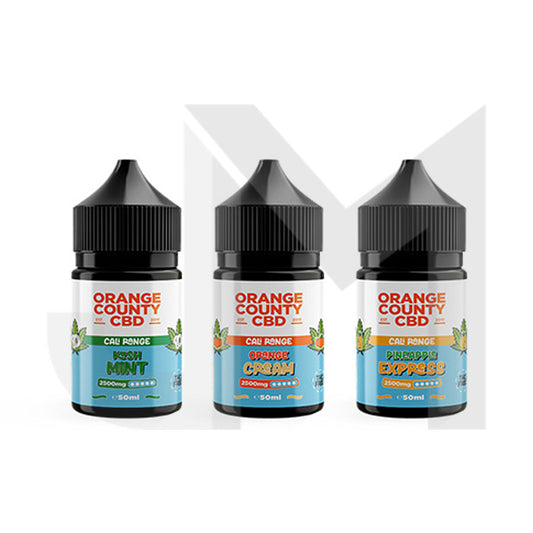
Orange County CBD Cali Range 1500mg CBD 50ml E-liquid (60VG/40PG)
Orange County CBD terpene infused Cali E-Liquid range is packed with award-winning Broad Spectrum...Orange County CBD Cali Range 1500mg CBD 50ml E-liquid (60VG/40PG)
Orange County CBD terpene infused Cali E-Liquid range is packed with award-winning Broad Spectrum...Login to view price -

CALI VAPE 500mg Broad Spectrum CBD E-liquid 10ml (60PG/40VG)
SALE OR RETURN GUARANTEE available for this product!Return within 120 days if unsold (see terms) ...SALE OR RETURN GUARANTEECALI VAPE 500mg Broad Spectrum CBD E-liquid 10ml (60PG/40VG)
SALE OR RETURN GUARANTEE available for this product!Return within 120 days if unsold (see terms) ...SALE OR RETURN GUARANTEELogin to view price -
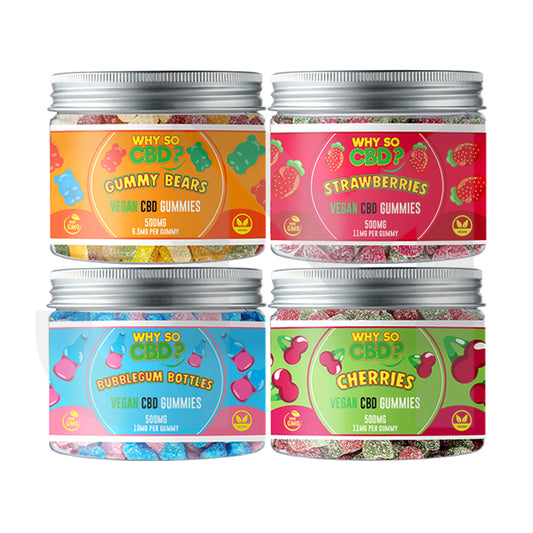
Why So CBD? 500mg Broad Spectrum CBD Small Vegan Gummies - 11 Flavours
Novel Food application number: RP438 SALE OR RETURN GUARANTEE available for this product!Return w...SALE OR RETURN GUARANTEEWhy So CBD? 500mg Broad Spectrum CBD Small Vegan Gummies - 11 Flavours
Novel Food application number: RP438 SALE OR RETURN GUARANTEE available for this product!Return w...SALE OR RETURN GUARANTEELogin to view price -
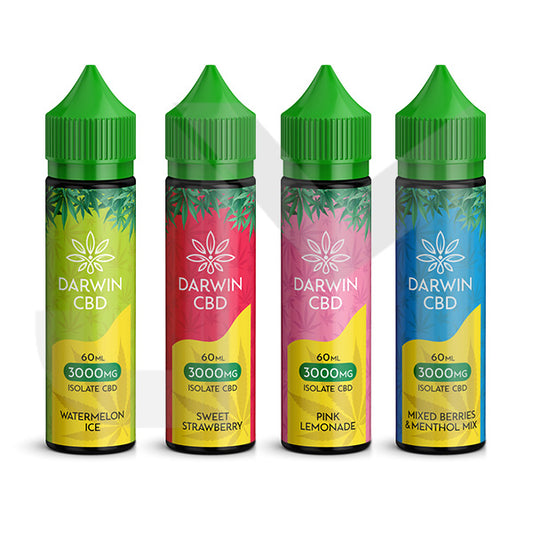
Darwin 3000mg CBD Isolate E-Liquid 60ml
Bringing their popular brand of CBD isolate infused disposables in the form of these CBD E-liquid...Darwin 3000mg CBD Isolate E-Liquid 60ml
Bringing their popular brand of CBD isolate infused disposables in the form of these CBD E-liquid...Login to view price -
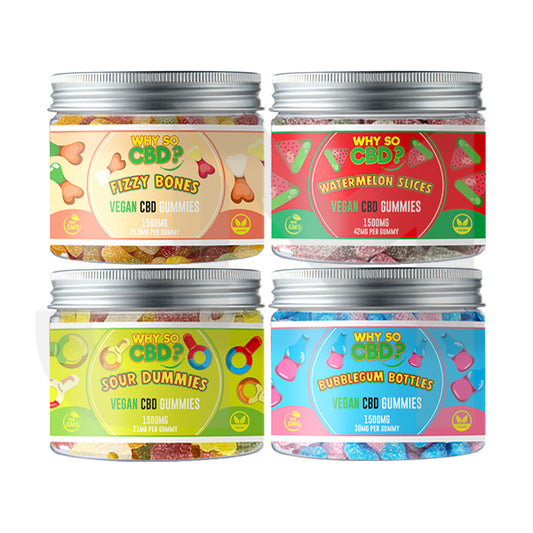
Why So CBD? 1500mg Broad Spectrum CBD Small Vegan Gummies - 11 Flavours
Novel Food application number: RP438 SALE OR RETURN GUARANTEE available for this product!Return w...SALE OR RETURN GUARANTEEWhy So CBD? 1500mg Broad Spectrum CBD Small Vegan Gummies - 11 Flavours
Novel Food application number: RP438 SALE OR RETURN GUARANTEE available for this product!Return w...SALE OR RETURN GUARANTEELogin to view price -

Why So CBD? 1000mg Broad Spectrum CBD Small Vegan Gummies - 11 Flavours
Novel Food application number: RP438 SALE OR RETURN GUARANTEE available for this product!Return w...SALE OR RETURN GUARANTEEWhy So CBD? 1000mg Broad Spectrum CBD Small Vegan Gummies - 11 Flavours
Novel Food application number: RP438 SALE OR RETURN GUARANTEE available for this product!Return w...SALE OR RETURN GUARANTEELogin to view price -

Hempthy 300mg CBD Gummies 30 Ct Pouch
Novel Food application number: RP349 Made by an award-winning Manufacturer of CBD products, the H...Hempthy 300mg CBD Gummies 30 Ct Pouch
Novel Food application number: RP349 Made by an award-winning Manufacturer of CBD products, the H...Login to view price -
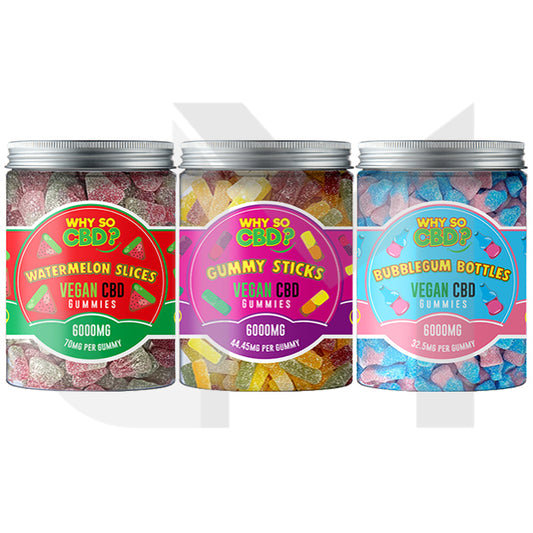
Why So CBD? 6000mg Broad Spectrum CBD Large Vegan Gummies - 11 Flavours
Novel Food application number: RP438 SALE OR RETURN GUARANTEE available for this product!Return w...SALE OR RETURN GUARANTEEWhy So CBD? 6000mg Broad Spectrum CBD Large Vegan Gummies - 11 Flavours
Novel Food application number: RP438 SALE OR RETURN GUARANTEE available for this product!Return w...SALE OR RETURN GUARANTEELogin to view price -
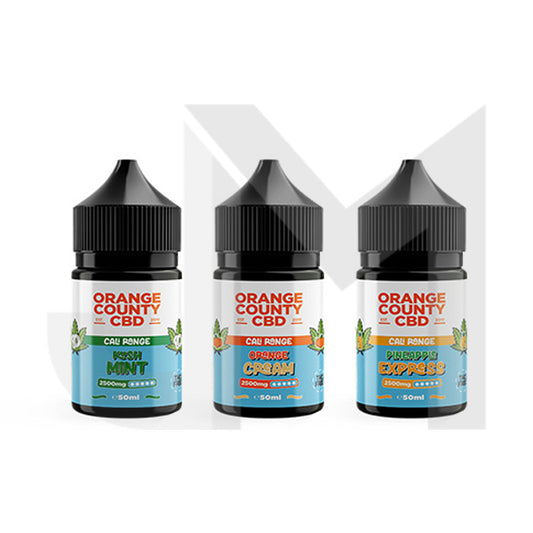
Orange County CBD Cali Range 2500mg CBD 50ml E-liquid (60VG/40PG)
Orange County CBD terpene infused Cali E-Liquid range is packed with award-winning Broad Spectrum...Orange County CBD Cali Range 2500mg CBD 50ml E-liquid (60VG/40PG)
Orange County CBD terpene infused Cali E-Liquid range is packed with award-winning Broad Spectrum...Login to view price -

Aztec CBD 2000mg Broad Spectrum Starter Pro Pod Vape Kit 2000 Puffs
UK Vape Ban Exempt ✅
Novel Food application number: RP349 Aztec CBD 2000mg Broad Spectrum Starter Pro Pod Vape Kit del...Aztec CBD 2000mg Broad Spectrum Starter Pro Pod Vape Kit 2000 Puffs
UK Vape Ban Exempt ✅
Novel Food application number: RP349 Aztec CBD 2000mg Broad Spectrum Starter Pro Pod Vape Kit del...Login to view price -

Orange County CBD 1200mg Gummies - Small Pack
Novel Food application number: RP427 Orange County CBD is trusted by countless individuals intern...Orange County CBD 1200mg Gummies - Small Pack
Novel Food application number: RP427 Orange County CBD is trusted by countless individuals intern...Login to view price -

Canna Magic Handmade 100mg CBD Bath Bombs
Plant Power! Canna Magic - Specialising in CBD and Hemp Skincare Taking a relaxing bath at the e...-23%CLEARANCECanna Magic Handmade 100mg CBD Bath Bombs
Plant Power! Canna Magic - Specialising in CBD and Hemp Skincare Taking a relaxing bath at the e...Login to view priceSale -

CALI TERPENES Premium USA Grown Terpene Extracts - 2ml
SALE OR RETURN GUARANTEE available for this product!Return within 120 days if unsold (see terms...SALE OR RETURN GUARANTEECALI TERPENES Premium USA Grown Terpene Extracts - 2ml
SALE OR RETURN GUARANTEE available for this product!Return within 120 days if unsold (see terms...SALE OR RETURN GUARANTEELogin to view price -
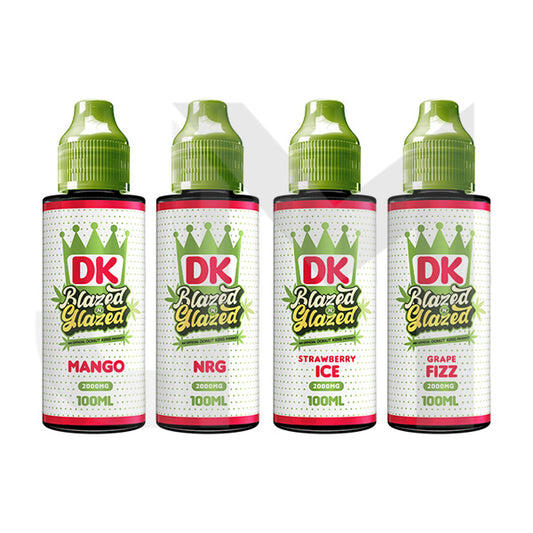
DK Blazed N Glazed 2000mg CBD E-liquid 120ml (50VG/50PG)
With their range of delightful e-liquids that's infused with CBD, Donut King introduce their new ...DK Blazed N Glazed 2000mg CBD E-liquid 120ml (50VG/50PG)
With their range of delightful e-liquids that's infused with CBD, Donut King introduce their new ...Login to view price -

420 E-liquids 1500mg Broad-Spectrum CBD E-Liquids (40VG/60PG)
Introducing 420 E-liquids Premium 1500mg CBD E-Liquids, a collection that beautifully blends th...-70%CLEARANCE420 E-liquids 1500mg Broad-Spectrum CBD E-Liquids (40VG/60PG)
Introducing 420 E-liquids Premium 1500mg CBD E-Liquids, a collection that beautifully blends th...Login to view priceSale -

1 Step CBD 30000mg Natural Pet Hemp Oil 30ml
SALE OR RETURN GUARANTEE available for this product!Return within 120 days if unsold (see terms) ...SALE OR RETURN GUARANTEE1 Step CBD 30000mg Natural Pet Hemp Oil 30ml
SALE OR RETURN GUARANTEE available for this product!Return within 120 days if unsold (see terms) ...SALE OR RETURN GUARANTEELogin to view price -

Purity 1600mg Full-Spectrum CBD Vegan Gummies 400g
SALE OR RETURN GUARANTEE available for this product!Return within 120 days if unsold (see terms) ...SALE OR RETURN GUARANTEEPurity 1600mg Full-Spectrum CBD Vegan Gummies 400g
SALE OR RETURN GUARANTEE available for this product!Return within 120 days if unsold (see terms) ...SALE OR RETURN GUARANTEELogin to view price -

Purity 1000mg Full-Spectrum CBD Vegan Gummies 400g
SALE OR RETURN GUARANTEE available for this product!Return within 120 days if unsold (see terms) ...SALE OR RETURN GUARANTEEPurity 1000mg Full-Spectrum CBD Vegan Gummies 400g
SALE OR RETURN GUARANTEE available for this product!Return within 120 days if unsold (see terms) ...SALE OR RETURN GUARANTEELogin to view price -

Purity 600mg Full-Spectrum CBD Vegan Gummies 400g
SALE OR RETURN GUARANTEE available for this product!Return within 120 days if unsold (see terms) ...SALE OR RETURN GUARANTEEPurity 600mg Full-Spectrum CBD Vegan Gummies 400g
SALE OR RETURN GUARANTEE available for this product!Return within 120 days if unsold (see terms) ...SALE OR RETURN GUARANTEELogin to view price -

Purity 600mg Full-Spectrum CBD Vegan Gummies 150g
SALE OR RETURN GUARANTEE available for this product!Return within 120 days if unsold (see terms) ...SALE OR RETURN GUARANTEEPurity 600mg Full-Spectrum CBD Vegan Gummies 150g
SALE OR RETURN GUARANTEE available for this product!Return within 120 days if unsold (see terms) ...SALE OR RETURN GUARANTEELogin to view price -

Purity 300mg Full-Spectrum CBD Vegan Gummies 150g
SALE OR RETURN GUARANTEE available for this product!Return within 120 days if unsold (see terms) ...SALE OR RETURN GUARANTEEPurity 300mg Full-Spectrum CBD Vegan Gummies 150g
SALE OR RETURN GUARANTEE available for this product!Return within 120 days if unsold (see terms) ...SALE OR RETURN GUARANTEELogin to view price -

Purity 120mg Full-Spectrum CBD Vegan Gummies 150g
SALE OR RETURN GUARANTEE available for this product!Return within 120 days if unsold (see terms) ...SALE OR RETURN GUARANTEEPurity 120mg Full-Spectrum CBD Vegan Gummies 150g
SALE OR RETURN GUARANTEE available for this product!Return within 120 days if unsold (see terms) ...SALE OR RETURN GUARANTEELogin to view price -

SPLYFT Cannabis Terpene Infused Rolling Cones: "Best-Selling" Mixed Flavours
The Official UK and Europe Wholesale Distributor for SPLYFTCHOOSE YO' SPLYFT Discover the ultimat...SPLYFT Cannabis Terpene Infused Rolling Cones: "Best-Selling" Mixed Flavours
The Official UK and Europe Wholesale Distributor for SPLYFTCHOOSE YO' SPLYFT Discover the ultimat...Login to view price -

1 Step CBD 100mg Full Spectrum CBD Blackcurrant & Liquorice Taffy Grab Bag - 60g
SALE OR RETURN GUARANTEE available for this product!Return within 120 days if unsold (see terms)...SALE OR RETURN GUARANTEE1 Step CBD 100mg Full Spectrum CBD Blackcurrant & Liquorice Taffy Grab Bag - 60g
SALE OR RETURN GUARANTEE available for this product!Return within 120 days if unsold (see terms)...SALE OR RETURN GUARANTEELogin to view price -

1 Step CBD 100mg Full Spectrum CBD Lime Taffy Grab Bag - 60g
SALE OR RETURN GUARANTEE available for this product!Return within 120 days if unsold (see terms)...SALE OR RETURN GUARANTEE1 Step CBD 100mg Full Spectrum CBD Lime Taffy Grab Bag - 60g
SALE OR RETURN GUARANTEE available for this product!Return within 120 days if unsold (see terms)...SALE OR RETURN GUARANTEELogin to view price -

1 Step CBD 100mg Full Spectrum CBD Spearmint Taffy Grab Bag - 60g
SALE OR RETURN GUARANTEE available for this product!Return within 120 days if unsold (see terms)...SALE OR RETURN GUARANTEE1 Step CBD 100mg Full Spectrum CBD Spearmint Taffy Grab Bag - 60g
SALE OR RETURN GUARANTEE available for this product!Return within 120 days if unsold (see terms)...SALE OR RETURN GUARANTEELogin to view price -

1 Step CBD 250mg Full Spectrum CBD Blackcurrant & Liquorice Taffy Grab Bag - 150g
SALE OR RETURN GUARANTEE available for this product!Return within 120 days if unsold (see terms)...SALE OR RETURN GUARANTEE1 Step CBD 250mg Full Spectrum CBD Blackcurrant & Liquorice Taffy Grab Bag - 150g
SALE OR RETURN GUARANTEE available for this product!Return within 120 days if unsold (see terms)...SALE OR RETURN GUARANTEELogin to view price -

1 Step CBD 250mg Full Spectrum CBD Lime Taffy Grab Bag - 150g
SALE OR RETURN GUARANTEE available for this product!Return within 120 days if unsold (see terms)...SALE OR RETURN GUARANTEE1 Step CBD 250mg Full Spectrum CBD Lime Taffy Grab Bag - 150g
SALE OR RETURN GUARANTEE available for this product!Return within 120 days if unsold (see terms)...SALE OR RETURN GUARANTEELogin to view price -

1 Step CBD 250mg Full Spectrum CBD Spearmint Taffy Grab Bag - 150g
SALE OR RETURN GUARANTEE available for this product!Return within 120 days if unsold (see terms)...SALE OR RETURN GUARANTEE1 Step CBD 250mg Full Spectrum CBD Spearmint Taffy Grab Bag - 150g
SALE OR RETURN GUARANTEE available for this product!Return within 120 days if unsold (see terms)...SALE OR RETURN GUARANTEELogin to view price -

1 Step CBD 10mg CBD Patches
SALE OR RETURN GUARANTEE available for this product!Return within 120 days if unsold (see terms)E...SALE OR RETURN GUARANTEESALE OR RETURN GUARANTEE available for this product!Return within 120 days if unsold (see terms)E...SALE OR RETURN GUARANTEELogin to view price -

1 Step CBD 20mg CBD Patches
SALE OR RETURN GUARANTEE available for this product!Return within 120 days if unsold (see terms)T...SALE OR RETURN GUARANTEESALE OR RETURN GUARANTEE available for this product!Return within 120 days if unsold (see terms)T...SALE OR RETURN GUARANTEELogin to view price -

1 Step CBD 30mg CBD Patches
SALE OR RETURN GUARANTEE available for this product!Return within 120 days if unsold (see terms)E...SALE OR RETURN GUARANTEESALE OR RETURN GUARANTEE available for this product!Return within 120 days if unsold (see terms)E...SALE OR RETURN GUARANTEELogin to view price -

1 Step CBD 50mg CBD Patches
SALE OR RETURN GUARANTEE available for this product!Return within 120 days if unsold (see terms)T...SALE OR RETURN GUARANTEESALE OR RETURN GUARANTEE available for this product!Return within 120 days if unsold (see terms)T...SALE OR RETURN GUARANTEELogin to view price -

Opus Magnum 70mg CBD Patches - 4 pack
SALE OR RETURN GUARANTEE available for this product!Return within 120 days if unsold (see terms)T...Opus Magnum 70mg CBD Patches - 4 pack
SALE OR RETURN GUARANTEE available for this product!Return within 120 days if unsold (see terms)T...Login to view price -

Opus Magnum 70mg CBD Patches - 8 pack
SALE OR RETURN GUARANTEE available for this product!Return within 120 days if unsold (see terms)E...Opus Magnum 70mg CBD Patches - 8 pack
SALE OR RETURN GUARANTEE available for this product!Return within 120 days if unsold (see terms)E...Login to view price -

Opus Magnum 70mg CBD Patches - 12 pack
SALE OR RETURN GUARANTEE available for this product!Return within 120 days if unsold (see terms)E...Opus Magnum 70mg CBD Patches - 12 pack
SALE OR RETURN GUARANTEE available for this product!Return within 120 days if unsold (see terms)E...Login to view price
Wholesale CBD Products Q & A
What is CBD?
Cannabidiol, or CBD, is a chemical compound that’s found in the cannabis plant. Typically extracted from hemp, it’s gaining popularity in the UK and other parts of the world because of its therapeutic effects, which range from increasing one’s sense of calm to relieving symptoms of certain medical conditions.CBD can be bought as an isolate or as CBD oil. It can also be infused in a wide variety of products such as vape e-liquid, food like lollipops and gum, and drinks.
What is the legal status of CBD in the UK?
Navigating the intricate landscape of CBD legality in the UK is an important aspect of the CBD wholesale journey. It's vital to understand these laws and regulations when considering the buying or selling of CBD products.
In the UK, CBD is legal, but it is subject to certain stipulations to ensure public safety and regulatory compliance. For a CBD product to be considered lawful, it must be extracted from an approved industrial-grade hemp strain that's been sanctioned by the European Union. This specific requirement is put in place to control the THC (tetrahydrocannabinol) content in the hemp plant and hence, the CBD derived from it. Therefore, to maintain legality within the UK, CBD products must contain no more than 0.2% THC content.
Furthermore, the extracted CBD itself should be tested in official labs, demonstrating that it contains no detectable levels of THC. It's the guarantee of these lab results that ensures the products don't elicit any psychoactive effects in users.
A special note to bear in mind is that while the general sale of CBD is legal, it's currently prohibited to sell CBD products as medicines without obtaining the proper licensing. This process involves rigorous assessments and can only be authorised by the Medicines and Healthcare products Regulatory Agency (MHRA). However, in specific cases, some doctors in the UK can already prescribe CBD-based medications to their patients.
These laws and guidelines ensure that the CBD market operates within a safe, controlled framework, offering consumers high-quality, compliant products. By observing these rules, JM Wholesale remains a trusted partner in the CBD wholesale industry. Our products adhere to these regulations, providing you with a reliable and lawful CBD supply for your business ventures.
Do I need a license to sell CBD in the UK?
According to CBD regulations, you don’t need a license currently as long as you’re not selling it as a medical product. However, the EU has a Novel Foods legislation, which requires sellers of novel foods to apply for a license from the EU and register their products. CBD products like oils, capsules, foods, and drinks are considered novel food. This isn’t enforced in the UK yet, though, and there are ongoing deliberations.
Are your products Novel Food Compliant?
The short answer is yes, all our products are Novel Food Compliant. Getting approval is a long process that can take up to a year. Most of our manufacturers have already submitted the extensive documentation required for certification, and are only waiting for approval. The work has been done, and our customers can rest assured that all the products we carry have been evaluated against strict compliance regulations in preparation for the Food Standards Agency’s Novel Foods legislation.
What CBD products need FSA approval?
Any food item with CBD extract needs to pass through the FSA. Hemp and hemp-related products fall outside of the scope of the Novel Food Regulation, as evidence can be found on their use before May 1997. Non-consumable items such as vape liquids, cosmetics, and products that make medicinal claims also do not need FSA approval.
It’s also worth noting that anything claiming to be a medicine will require a licence from the Medicines and Healthcare Products Regulatory Agency (MHRA).
Are you a partner of any CBD or Hemp related organisations?
JM Wholesale is a proud member and a partner of the European Industrial Hemp Association (EIHA). Being a part of EIHA allows us to stay abreast of the latest news and regulatory developments in the rapidly evolving world of hemp, and participate in the creation and advocating of policies that will shape the industry.
What certifications/accreditations do you have to certify products?
For all of our CBD products, we have COA’s (certificate of analysis) which is a lab report on the chemical make-up (e.g. contents) to indicate all levels of cannabinoids and they are in accordance with laws in that particular county, for example in the UK it would be the misuse of drugs act.
All of our laboratory reports are available on our website.
What do I need to know about marketing CBD in the UK?
When marketing CBD in the UK, it is crucial to understand the relevant regulations and guidelines to ensure compliance and success in this growing market.
As mentioned, CBD products cannot be sold as medicine in the UK unless a license is obtained, which can be a strict and lengthy process. Consequently, many companies choose to market their CBD products as nutritional supplements. However, it is important to note that these products must not make any medical claims or suggest that they can treat, diagnose, or prevent specific health conditions.
The CBD content of a product must be clearly stated on the packaging. This includes the amount of CBD per serving and the total amount of CBD in the product. In addition to CBD content, other important information such as ingredients, manufacturer details, and expiration date must also be displayed. This ensures transparency and helps consumers make informed choices when purchasing CBD products.
In the UK, CBD products must also adhere to the Novel Food Regulations, which were introduced by the European Union and continue to be enforced in the UK post-Brexit. Under these regulations, CBD products must receive authorization from the Food Standards Agency (FSA) before they can be marketed. To secure this authorization, companies need to provide evidence of the product's safety, quality, and efficacy.
Furthermore, marketing efforts for CBD products in the UK should be mindful of advertising regulations. For instance, companies must not target minors, and advertising materials should be free from any misleading or unsubstantiated claims. Social media advertising may also be subject to certain restrictions, so it is essential to stay up-to-date with platform-specific guidelines.
Lastly, it is important to consider public perception and consumer attitudes when marketing CBD in the UK. While CBD products have become more widely accepted in recent years, there may still be some stigma or misconceptions associated with cannabis-derived products. To overcome this, companies should focus on educating consumers about the potential benefits of CBD, emphasizing the non-psychoactive nature of the compound, and differentiating their products from those containing THC, the psychoactive component in cannabis.
In short, marketing CBD in the UK requires a thorough understanding of the regulatory landscape and a commitment to transparency, compliance, and consumer education. By adhering to these principles, companies can successfully navigate the growing CBD market and establish a strong presence as a CBD retailer.
What types of businesses do you supply CBD?
JM Wholesale supply wholesale CBD to a variety of businesses ranging from:
- CBD Specialist stores
- These businesses focus primarily on selling CBD products. Our wide array of offerings from CBD oils to edibles, topicals, and vapes, cater to the diverse clientele that these stores attract. We provide the latest and most innovative products in the market, ensuring these stores stay ahead of the competitive curve.
- Off licences/ newsagents
- Local convenience stores and newsagents are increasingly incorporating CBD products into their inventory due to growing customer demand and ease of sales. We supply them with a range of CBD-infused beverages, edibles, and small pack sizes of oils and capsules that appeal to their wide customer base.
- Discount stores
- Price-conscious and patient customers looking for high-quality CBD products often turn to discount stores. JM Wholesale provides competitively priced CBD items that don’t compromise on quality, allowing these businesses to cater to their customers' needs effectively.
- Vape stores
- With vaping becoming a popular method of CBD consumption, vape stores are a significant part of our clientele. We supply a variety of CBD vape liquids, vape kits, and related accessories to meet the growing demand.
- Health & nutrition stores
- These businesses cater to consumers focused on wellness and health. We offer a diverse range of CBD products, including CBD-infused teas, oils, supplements, and topicals that align with the ethos of these stores.
- Therapists
- Massage and physical therapists are increasingly incorporating CBD oils and topicals into their treatment protocols due to CBD's potential anti-inflammatory and pain-relieving properties. We provide these professionals with high-quality, lab-tested CBD oils and lotions.
- Pharmacies
- Many pharmacies are now stocking CBD products to meet their customers' growing interest. JM Wholesale supplies a variety of CBD products, including oils, capsules, and topicals suitable for a pharmacy setting, all of which comply with the necessary legal requirements.
- Petrol stations
- On-the-go consumers often stop at petrol stations for quick purchases. We offer CBD gums, mints, drinks, and easy-to-consume products suitable for these businesses, enabling them to provide customers with convenient wellness on the move.
- Gyms
- Gyms represent a growing market for CBD products. Many fitness enthusiasts and athletes are turning to CBD to potentially aid in their recovery, enhance performance, and promote overall wellness. This includes protein powders infused with CBD, drinks, topical creams and oils.
- Massage therapists
- More and more massage therapists are integrating CBD-infused oils and creams into their sessions to potentially enhance their clients' relaxation and recovery. The possible anti-inflammatory and pain-relieving properties of CBD make it an excellent adjunct to massage therapy.
- Pop-up shops
- Pop-up shops, owing to their temporary and novel nature, require a versatile, in-demand product range that quickly captures consumer interest. CBD products, with their growing popularity and wide application, fit the bill perfectly. JM Wholesale offers an extensive range of appealing CBD products ideally suited for pop-up shop environments. From eye-catching CBD-infused edibles, teas, and beverages to topical creams, oils, and bath products, we have items that can attract a diverse audience. Plus, our drop-shipping service can be a great fit for pop-up shops, allowing you to offer a wide variety of products without the need for substantial upfront inventory investment.
- Ecommerce stores
- Navigating the online retail world requires a reliable, quality-assured product source, and JM Wholesale excels in fulfilling these needs for eCommerce businesses. We offer a vast range of CBD products, each with comprehensive lab reports to establish quality and compliance - essentials in the competitive digital marketplace.
What are the benefits of working with JM Wholesale?
-
We pride ourselves in providing the best customer service in the market
-
An experienced team with outstanding levels of knowledge to give you all the assistance you need
- A regular flow of new products meaning you’ll always be ahead of the market
- A vast range of products and we will also source products for you so needn’t go anywhere else
- We use marketing tools such as Instagram, emails and WhatsApp
- A dedicated price beating service.
How do I become a CBD distributor?
Get in touch via phone or email, and complete our registration form online. Once the account is set up, we offer support via phone, WhatsApp and email.
Our experienced team will offer you help and advice on what products to start off with and what direction you can go in
We also have the option of becoming a drop-shipping customer, this way you can have the full range of products on your website without taking the risk and investing so much money in stock,
How profitable is a CBD store?
The economic allure of the CBD market in the UK is undoubtedly compelling, particularly from the vantage point of a CBD store proprietor seeking to capitalise on the thriving wholesale CBD sector. With the current market valuation of approximately £300 million, and a projected trajectory that expects this figure to more than triple over the next five years, the CBD landscape in the UK offers a fertile ground for substantial revenue generation and business growth.
Drilling down into the financial dynamics of the CBD industry, profit margins can typically range from 40% to 60%. These figures, of course, are subject to fluctuations based on a myriad of factors. Key amongst these are the specific brands stocked in your inventory, the market positioning of these brands, and the comprehensive understanding of your customer base's preferences.
In the wholesale CBD sector, an array of product categories exist, each offering unique opportunities for profit. From CBD vape liquids and edibles, to tinctures and oils, and onto the growing field of CBD-infused skincare and wellness products, the scope for generating revenue is vast. However, it's crucial to navigate these waters with a keen understanding of market trends, customer preferences, and regulatory landscape.
One particularly profitable segment within this panorama is the raw CBD market. This involves purchasing wholesale CBD isolates or broad-spectrum CBD in bulk, which provides a cost-effective base for creating a unique, proprietary line of CBD products. By processing raw CBD into finished products, you can create offerings tailored to the specific needs and preferences of your customer base. Such personalised products not only drive customer loyalty but also enhance profit margins, as they can often command higher retail prices.
Can you sell CBD on Google?
It is currently prohibited for companies selling products containing CBD to advertise on Google, as cannabidiol is listed under unapproved pharmaceuticals and supplements for its ad platform. CBD brands need to rely on search engine optimisation to appear high up in search engine results.
Can you sell CBD on Facebook?
Though CBD isn’t mentioned specifically, Facebook representatives point to their community standards, under the regulated goods section, as the listed restrictions against CBD advertising. Posts can be made about CBD products on a Facebook business page, but they can’t be promoted as a paid advertisement.
Can you sell CBD on Twitter?
Twitter allows CBD products to be advertised on their platform, however they must be approved and authorised, with relevant lab-testing certifications available. Learn more here.
Can you sell CBD on YouTube?
Rules for CBD on YouTube are almost identical to rules for CBD on Google. This is because Google's ads network extends to and includes YouTube.
Is it smart to invest in CBD?
The CBD market is currently worth £300 million in the UK. This figure is expected to more than triple in the next five years, which equates to a £1 billion market in CBD by 2025. The number of CBD oil users doubled from 125,000 to 250,000 between 2017 and 2018. Based on these figures, yes it’s definitely a smart move to invest in CBD.
Can you dropship CBD?
It is legal to dropship CBD in the EU. We are one of the UK’s most respected wholesalers of CBD products and have one of the best dropshipping platforms on the market, making us perfectly placed to help you launch and develop your CBD business.
What’s the best way to store CBD?
The CBD extraction itself can last up to two years, but the expiration date of a specific CBD product depends on its ingredients as a whole. To prolong your product’s shelf life, it has to be kept away from heat, light, and air. For this reason, most CBD products have dark packaging, such as tinted bottles for oils, and they should be placed in cool, dark environments like closets or drawers.


























































